 The Forefront Preachers Group meets (as the "PG Tips") from time to time to discuss themes for future Sunday service speaking series. We produce leaflets as an overview to each series, enabling people to read ahead and form their own understanding of what particular passages have to say.
The Forefront Preachers Group meets (as the "PG Tips") from time to time to discuss themes for future Sunday service speaking series. We produce leaflets as an overview to each series, enabling people to read ahead and form their own understanding of what particular passages have to say.
Here are our past and current series leaflets. Click on the titles below to open the PDFs. Note that they are mostly designed to print out double-sided on A4 paper and folded into thirds or half, so the 'front page' will usually be on the right hand of the first page.
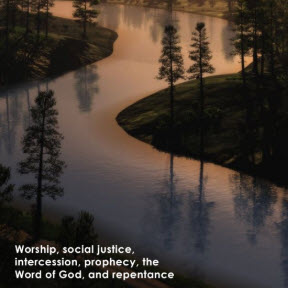
Worship, social justice, intercession, prophecy, the Word of God, and repentance - great themes with modern relevance from the ancient wisdom of the prophet Amos.
Lessons from the patriarch Jacob and his family - what can the church learn about being the 'family of God' from the Bible's warts-and-all account of our Old Testament fore-runners?
John, now the last of the 12 apostles who knew Jesus in the flesh, is getting older and watching the scattered church contend with heresies and cults. He lays out some keys to successful Christian living. We're going to reflect on five of them.
Forefront concludes its 3-series study of 1st Corinthians, the letter which Paul wrote to a church which was gifted and vibrant, misled and rebellious.
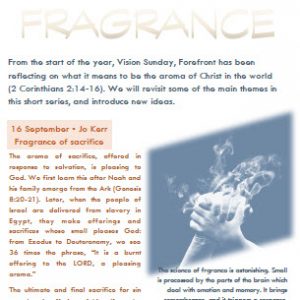
From the start of the year, Vision Sunday, Forefront has been reflecting on what it means to be the aroma of Christ in the world (2 Corinthians 2:14-16). We will revisit some of the main themes in this short series, and introduce new ideas.
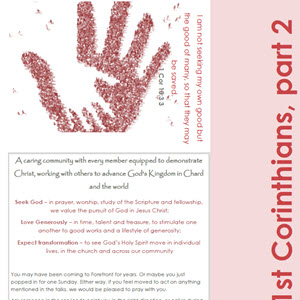
We looked at the first part of Paul's letter to the crazy, gifted church of Corinth in March and April. You can find the recordings of the speakers at forefront.org.uk/sermons/ and the series notes are also on the website.
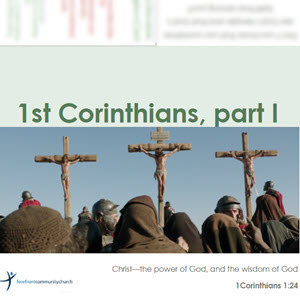
Paul's correspondents had told him of problems in the Corinthian church, and asked his opinion about rivalry and divisions, immorality and doctrine. Paul replies in a letter sent with Timothy.
Are our screens - phone, tablet, computer, TV - a tool for good or an attention-hogging addiction? Can we use them wisely and master them, or must they become our masters? For six weeks, we let the ancient book of Proverbs shed light on this most modern question.
In the letter written to the church he founded in Philippi, hand-carried to them about a decade after he set it up, Paul states in various ways how much joy the Philippian church brings him—and how much he wants them to rejoice in their salvation.

Forefront is reflecting on ‘calling’ this year—how God invites us to individual, specific tasks which answer the prayer, "thy Kingdom come" in our lives. During the summer holidays, we look at individuals who were called by God, to see what lessons we can learn from the way they were called, and the results of their obedience to that calling.

Jonah is unique among the books of the prophets in the Old Testament, in being a story about a prophet rather than a series of proclamations from one. While Jonah never says anything but the truth about God, he seems completely passive compared to the Ninevites, the sailors ... and to God himself, the real star of the book.

Many passages in the New Testament talk about the gifts which God the Holy Spirit distributes within the church, to equip each of us to play our part in building up the body. In this series, we start with the purpose of the gifts, rather than the way they appear - gifts of care, of leadership, of personal and church growth, before we end with thoughts on how to put them into practice.
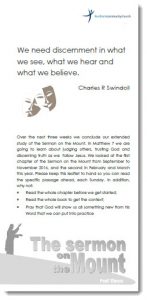
Sermon on the Mount, part 3 (Matt 7)
We are completing our overview of the Sermon on the Mount by reflecting on Matthew 7 in our next three Sunday meetings. The Sermon summarise the content of the main aspects of Jesus’s public preaching. We looked at the first chapter from September to November 2016, and the second chapter in February and March this year.
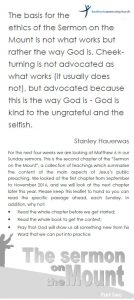
Sermon on the Mount, part 2 (Matt 6)
For the next four weeks we are looking at Matthew 6 in our Sunday sermons. This is the second chapter of the “Sermon on the Mount”, a collection of teachings which summarise the content of the main aspects of Jesus’s public preaching. We looked at the first chapter from September to November 2016, and we will look at the next chapter later this year.
From 22 January to 12 February 2017 we begin the year with four speakers tackling the first chapters of Genesis. What is each chapter all about, and what does it mean to us today?

From 18 September to 6 November 2016 we will be looking at Matthew 5, the first chapter of the “Sermon on the Mount”, a collection of teachings which summarise the content of the main aspects of Jesus’s public preaching. We will look at subsequent chapters in 2017.
Ezra: Leading in turbulent times
Who was Ezra, and why was his leadership crucial at one of Israel's most vulnerable moments? His story has plenty to teach us about worship, unity among the people of God, prayer and forgiveness, and about courageous living when the world either ignores or opposes true religion. Print it out double sided on A4 and fold in the middle. We consider this topic from 26 June to 24 July 2016.
The Spirit's role in changing our lives
Starting on Pentecost Sunday, we explore what difference the Holy Spirit makes in the life of the believer. The Spirit, promised by Jesus, makes God a living reality, changes and transforms our lives, and equips us for service. Note that this one prints out and folds in half lengthwise, then in half again, with the front page at bottom right. We consider this topic from 15 May to 5 June 2016.
A six-week investigation into what the book of Hebrews has to say about Jesus, the Son. We considered this topic from 21 February to 27 March (Easter Sunday) 2016.
Being Church - the Book of Acts
Forefront’s Vision speaks of community, working with others and God’s kingdom. These ideas are depicted in Acts 2:43-47, a description of the earliest Christian church in Jerusalem, with each theme expanded in other New Testament passages. We considered this topic from 10 January to 14 February 2016.
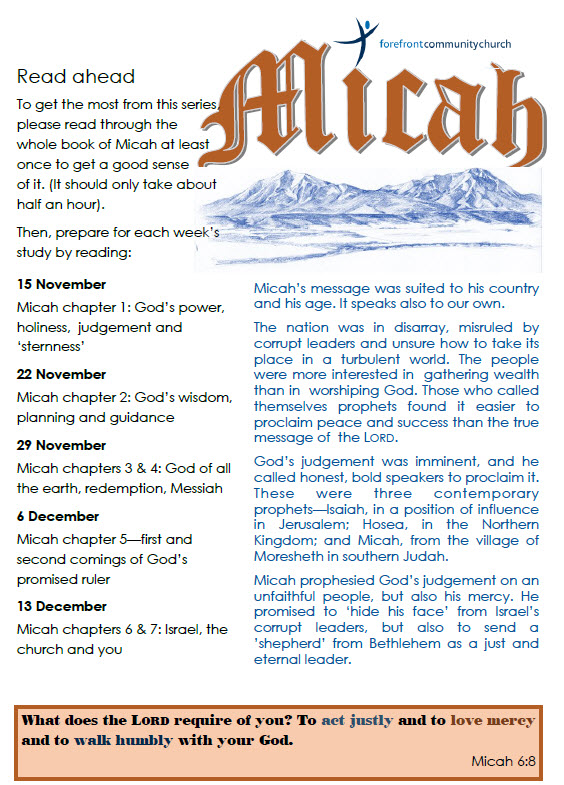
Micah prophesied God’s judgement on an unfaithful people, but also his mercy. He promised to ‘hide his face’ from Israel’s corrupt leaders, but also to send a ’shepherd’ from Bethlehem as a just and eternal leader. We considered this topic from 15 November to 13 December 2015.
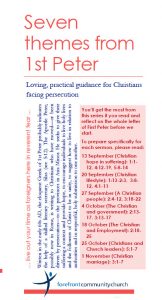
Loving, practical guidance for Christians facing persecution. We considered this topic from 13 September to 1 November 2015.
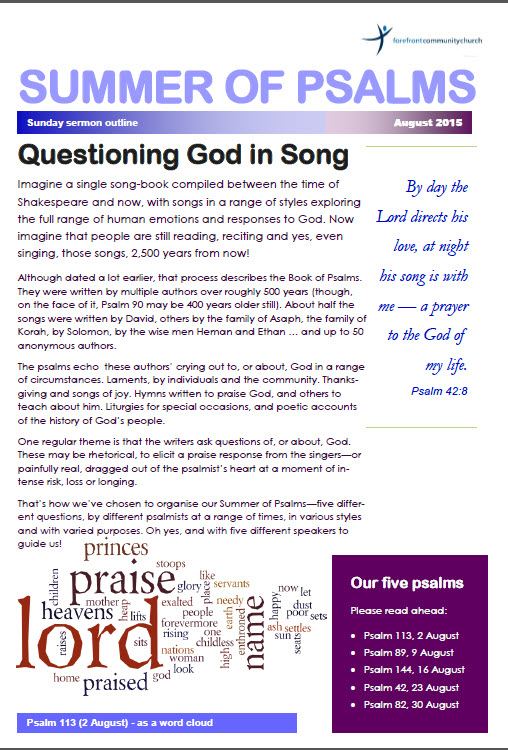
A regular theme in the Psalms is that the writers ask questions of, or about, God. These may be rhetorical, to elicit a praise response from the singers—or painfully real, dragged out of the psalmist’s heart at a moment of intense risk, loss or longing. That’s how we chose to organise our Summer of Psalms—five different questions, by different psalmists at a range of times, in various styles and with varied purposes. Oh yes, and with five different speakers to guide us! We ran this series from 2 to 30 August 2015.
Forefront’s first value for 2015 is “Seek God”. What happens when God meets with us? Throughout the Bible, God touch-es the lives of different people. In each case, he has a purpose: to call, to bless, to discipline, to teach. What can we learn from these different encounters so that we can understand God— and ourselves? We considered this topic from 28 June to 26 July 2015.
God in Action - the Holy Spirit
At the beginning of 2015 we updated the Forefront values: Seek God, Love Generously, Expect Transformation.
But how can we fulfil them? Only with the help of God him-self through his Holy Spirit, the person Jesus told us about be-fore he ascended to heaven. We considered this topic from 24 May to 7 June 2015.
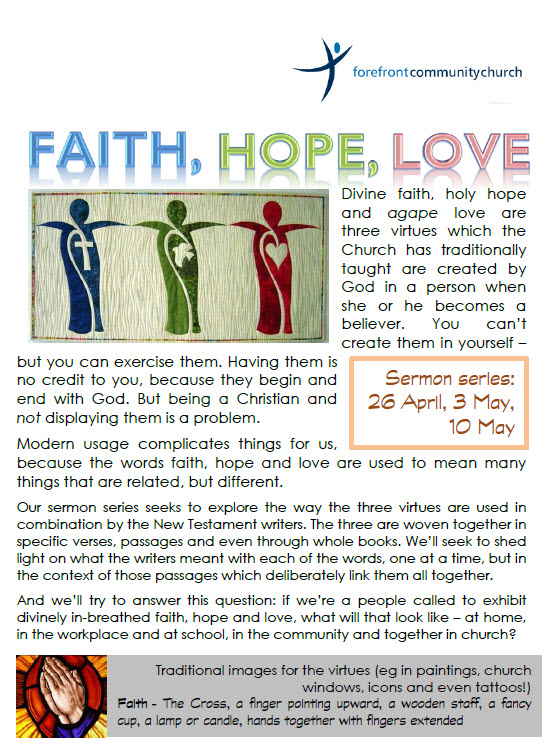
Divine faith, holy hope and agape love are three virtues which the Church has traditionally taught are created by God in a person when she or he becomes a believer. You can’t create them in yourself – but you can exercise them. Having them is no credit to you, because they begin and end with God. But being a Christian and not displaying them is a problem. We considered this topic from 26 April to 10 May 2015.
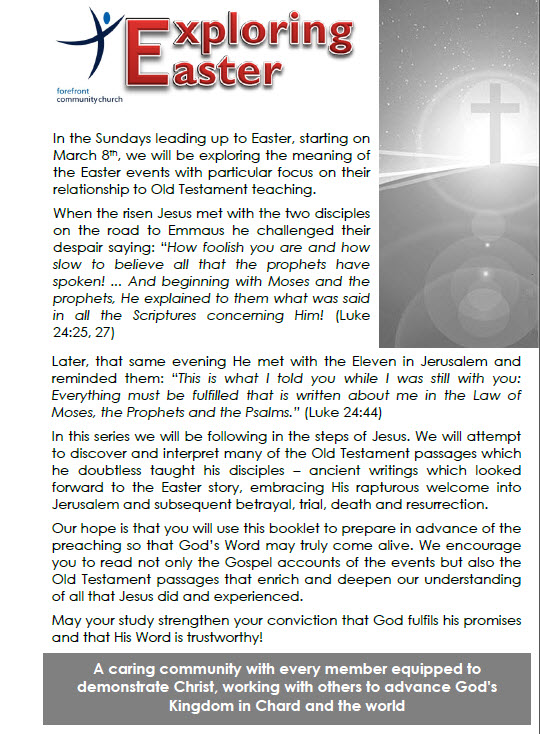
In the Sundays leading up to Easter, we will be exploring the meaning of the Easter events with particular focus on their relationship to Old Testament teaching. We considered this topic from 8 March to 5 April 2015.
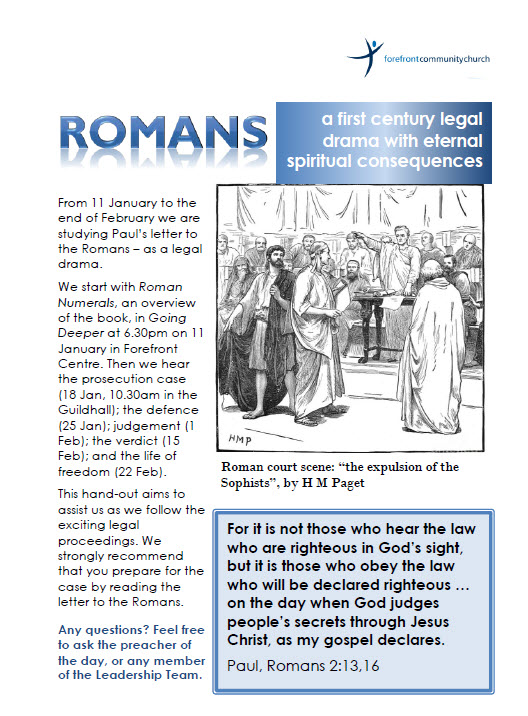
Paul’s letter to the Romans – as a legal drama. A first-century case with eternal spiritual consequences. We considered this topic from 18 January to 22 February 2015.
